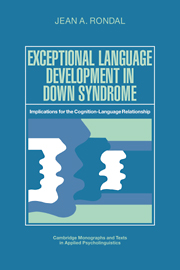 Exceptional Language Development in Down Syndrome
Exceptional Language Development in Down Syndrome Book contents
- Frontmatter
- Contents
- Foreword by Neil O'Connor
- Acknowledgments
- 1 Introduction
- 2 Language development in Down syndrome
- 3 Exceptional language development in mentally handicapped individuals
- 4 Cognition-language relationships and modularity issues
- 5 A case study
- 6 Theoretical discussion
- 7 General conclusions
- Appendixes
- References
- Index
4 - Cognition-language relationships and modularity issues
Published online by Cambridge University Press: 23 December 2009
- Frontmatter
- Contents
- Foreword by Neil O'Connor
- Acknowledgments
- 1 Introduction
- 2 Language development in Down syndrome
- 3 Exceptional language development in mentally handicapped individuals
- 4 Cognition-language relationships and modularity issues
- 5 A case study
- 6 Theoretical discussion
- 7 General conclusions
- Appendixes
- References
- Index
Summary
The nature of the relationship between language and thought has been of interest to philosophers, psychologists, and linguists for a long time. One will recall the position identified in recent times as the Whorfian hypothesis, associated with the names of Sapir (1921) and Whorf (1956). According to this position, and roughly put, the language that we speak directly affects the way we think. Over the years, the Whorfian hypothesis has taken two basic forms. The stronger form asserts that the categories and boundaries of language determine the categories and boundaries of perception and cognition. Consequently, people speaking unrelated languages should perceive and conceive the world in different ways. The weaker form posits that language orients our thinking in certain directions but does not actually force our thoughts to take specific forms. The Whorfian hypothesis has generated a great deal of research over the past decades in anthropological, linguistic, and psychological circles, leading to the conclusion that only its weaker form is at least partially acceptable (see R. Brown, 1968; see Bloom, 1981, for a different point of view, and R. Brown, 1986, for a reply). But even this weaker form did not go unchallenged. The opposite viewpoint, that thought processes are ontogenetically prior to language and that they constitute developmental prerequisites for language development, has found a grounding in the work of Piaget and followers. I will not consider here in detail the Vygotsky-Luria position on the problem because it pertains more particularly to the role of language and language representations in cognitive development and functioning.
- Type
- Chapter
- Information
- Exceptional Language Development in Down SyndromeImplications for the Cognition-Language Relationship, pp. 51 - 69Publisher: Cambridge University PressPrint publication year: 1995
